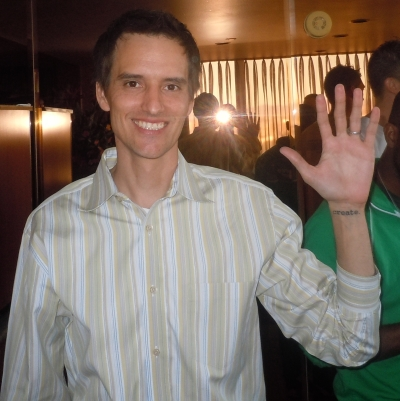MicroConf 2011 – Rob Walling
Rob Walling is a parallel entrepreneur (he runs more than one business at a time), author and conference organiser. Rob blogs at Software by Rob. His businesses include Dot Net Invoice and Micropreneur Academy.
Rob’s talk is about the lessons he has learned during his career. Some of these lessons reflect some of the personal issues Rob has faced as he realised life in the corporate cubicle and consulting world were not for him.
Personal goals
Rob  talks about why you are doing what you are doing. Rob has “create” tattooed on his wrist to remind himself to always create.
talks about why you are doing what you are doing. Rob has “create” tattooed on his wrist to remind himself to always create.
Being a developer is not enough
Rob demonstrates various websites which people wrote and shows how they are worth nothing because the developers could not market the software. They tried to sell the software via flippa.com website. They remained unsold. Despite being unique. Other sites were generating revenue but when sold they get sold for very little money. This demonstrates that a software business when for sale rarely generates as much value as the cost to create the business.
You need to learn how to market software.
“If my app was done today how would I market it?” Rob asks this before writing any code.
You learn from success and failure
Rob failed 5 or 6 times before succeeding. He created a Digg for person finance news. He also created a blog search engine submission tool. Although these were a success in that they worked and did what Rob needed them to do they were failures in terms of market acceptance.
He learned always solve a problem that:
- Has a demand. That people care about.
- You Know how to reach customers.
- Has a revenue model.
Customers must be able to find you.
Vertical niche vs horizontal niche
Vertical niches are good, cheap to market to, small markets so most people are not interested in trying to market to them. This in turn means you have less competition and what competition you have is probably not from a mega corporation with very deep pockets. Rob acquired DotNetInvoice and that has been a success. Turns out his main market is not small business, but .Net developers developing finance applications.
Horizontal niches are hard. For a small company, don’t try this. Do vertical niche instead.
Pricing
Low prices are hard. One time fees are no-go. High prices are better.
- $2 doesn’t leave you room to advertise. $200 does allow you to advertise.
- One time fees suck. No recurring revenue.
- Adwords is unstable. You will get out-competed for keywords. So what was working stops working because of people outbidding you (unwittingly spending too much) because they don’t know how to run their campaigns.
Outsourcing
Rob likes to outsource a lot of his work. An example is CMS Themer, website theming service Rob acquired. He has since sold it at a profit mainly because it was taking too much time dealing with clients. During the time Rob had CMS Themer he outsourced much of the theming work so that he did not need to do the work. However he still had to deal with clients.
You can outsource your advertising. An example Rob gives is buysellads.com (who also speak at MicroConf, I’ll be posting their talk later this week).
Fraud
Many entrepreneurs and business founders often feel like they are a fraud. Not that they are doing anything wrong or illegal, just that they never feel like they are “doing this right”, as if somehow they feel they could and should be doing it better, but they are making it up as they go along. I’ll include myself in that bunch, I’m in good company.
To illustrate this point Rob gives us a YouTube video to watch. Its worth watching because of the illusion that is created.
The drummer/pianist Lasse Gjertsen doesn’t know how to drum or play piano. He used editing tools to create a musical piece. Rob says he still feels this way. Some of Lasse’s other work is quite unusual and interesting, especially the “life as video game” tribute to 1980s video games.
Hamster wheel vs flywheel
There are different ways of running your business.
Hamster wheel
- One time fee for software
- Consulting
- Using hacker news, digg, twitter, slashdot to generate visitors
Flywheel
- recurring sales (webapps/maintenance)
- email list
- SEO
Examples: The blog post “How to detect a toxic customer” ended up being discussed on HackerNews/Twitter. This required up front work. Rob regards this as Hamster wheel work.
Whereas using SEO to optimize your website for search engines repays over a long period of time. Rob regards this as flywheel work.
Examples of companies that work via their email list:Seth Godin, AppSumo, Groupon, etc.
Why you should start marketing the day you start coding
Examples:
- Rob’s Start Small Stay Small book did not initially exist. He tested the idea for it before writing the book.
- Rob and Mike did the same for MicroConf. At the time the Conference was announced the speakers had been contacted but no contracts signed. No conference venue had been arranged. Only when interest was high enough did they proceed with these stages.
- DropBox tested their marketing idea with a video rather than an image.
Things to do:
- Test landing page
- Tweet, blog about it, etc
- Idea validation
- Marketing reality check
- Instant beta email list
- Good launch day
Easy steps to get the website up and running.
- Install wordpress
- Use the launch pad theme
- Or get a theme from themeforest
- Use unbounce
Misc
Rob donates 20% of his time per week to helping entreprenuers.
Question and Answers start at 39:00 into the linked talk.
Tomorrow I’ll be posting Mike Taber’s talk.